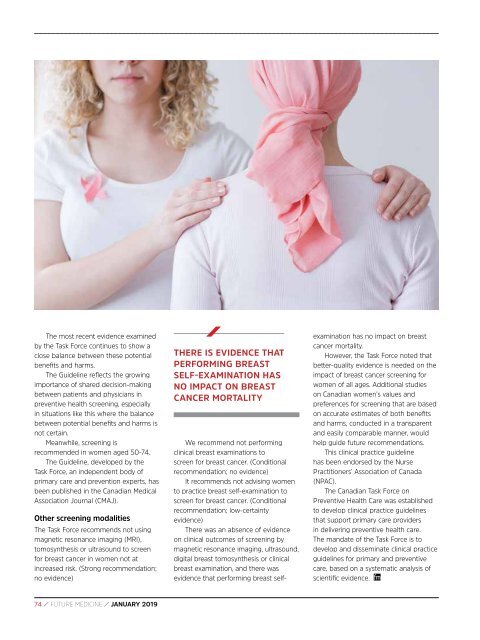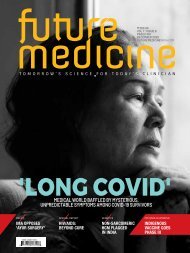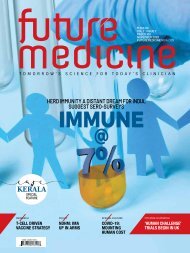FM JANUARY 2019 - digital edition
You also want an ePaper? Increase the reach of your titles
YUMPU automatically turns print PDFs into web optimized ePapers that Google loves.
The most recent evidence examined<br />
by the Task Force continues to show a<br />
close balance between these potential<br />
benefits and harms.<br />
The Guideline reflects the growing<br />
importance of shared decision-making<br />
between patients and physicians in<br />
preventive health screening, especially<br />
in situations like this where the balance<br />
between potential benefits and harms is<br />
not certain.<br />
Meanwhile, screening is<br />
recommended in women aged 50-74.<br />
The Guideline, developed by the<br />
Task Force, an independent body of<br />
primary care and prevention experts, has<br />
been published in the Canadian Medical<br />
Association Journal (CMAJ).<br />
Other screening modalities<br />
The Task Force recommends not using<br />
magnetic resonance imaging (MRI),<br />
tomosynthesis or ultrasound to screen<br />
for breast cancer in women not at<br />
increased risk. (Strong recommendation;<br />
no evidence)<br />
THERE IS EVIDENCE THAT<br />
PERFORMING BREAST<br />
SELF-EXAMINATION HAS<br />
NO IMPACT ON BREAST<br />
CANCER MORTALITY<br />
We recommend not performing<br />
clinical breast examinations to<br />
screen for breast cancer. (Conditional<br />
recommendation; no evidence)<br />
It recommends not advising women<br />
to practice breast self-examination to<br />
screen for breast cancer. (Conditional<br />
recommendation; low-certainty<br />
evidence)<br />
There was an absence of evidence<br />
on clinical outcomes of screening by<br />
magnetic resonance imaging, ultrasound,<br />
<strong>digital</strong> breast tomosynthesis or clinical<br />
breast examination, and there was<br />
evidence that performing breast selfexamination<br />
has no impact on breast<br />
cancer mortality.<br />
However, the Task Force noted that<br />
better-quality evidence is needed on the<br />
impact of breast cancer screening for<br />
women of all ages. Additional studies<br />
on Canadian women’s values and<br />
preferences for screening that are based<br />
on accurate estimates of both benefits<br />
and harms, conducted in a transparent<br />
and easily comparable manner, would<br />
help guide future recommendations.<br />
This clinical practice guideline<br />
has been endorsed by the Nurse<br />
Practitioners’ Association of Canada<br />
(NPAC).<br />
The Canadian Task Force on<br />
Preventive Health Care was established<br />
to develop clinical practice guidelines<br />
that support primary care providers<br />
in delivering preventive health care.<br />
The mandate of the Task Force is to<br />
develop and disseminate clinical practice<br />
guidelines for primary and preventive<br />
care, based on a systematic analysis of<br />
scientific evidence.<br />
74 / FUTURE MEDICINE / <strong>JANUARY</strong> <strong>2019</strong>


















